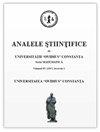Sums and products of intervals in ordered semigroups
IF 0.7
4区 数学
Q2 MATHEMATICS
Analele Stiintifice Ale Universitatii Ovidius Constanta-Seria Matematica
Pub Date : 2021-06-01
DOI:10.2478/auom-2021-0025
引用次数: 2
Abstract
Abstract We show a simple example for ordered semigroup 𝕊 = 𝕊 (+,⩽) that 𝕊 ⊆ℝ (ℝ denotes the real line) and ]a, b[ + ]c, d[ = ]a + c, b + d[ for all a, b, c, d ∈ 𝕊 such that a < b and c < d, but the intervals are no translation invariant, that is, the equation c +]a, b[ = ]c + a, c + b[ is not always fulfilled for all elements a, b, c ∈ 𝕊 such that a < b. The multiplicative version of the above example is shown too. The product of open intervals in the ordered ring of all integers (denoted by ℤ) is also investigated. Let Ix := {1, 2, . . ., x} for all x ∈ ℤ+ and defined the function g : ℤ+ → ℤ+ by g(x):=max{ y∈ℤ+|Iy⊆Ix⋅Ix } g\left( x \right): = \max \left\{ {y \in {\mathbb{Z}_ + }|{I_y} \subseteq {I_x} \cdot {I_x}} \right\} for all x ∈ ℤ+. We give the function g implicitly using the famous Theorem of Chebishev. Finally, we formulate some questions concerning the above topics.有序半群中区间的和与积
摘要:我们给出了一个简单的例子,对于有序半群 = (+, ),它(∈∈a, b[+] c, d[=]a + c, b + d[对于所有的a, b, c, d∈,使得a < b和c < d,但区间不是平移不变量,即方程c +]a, b[=]c + a, c + b[对于所有的元素a, b, c∈,使得a < b并不总是满足。也给出了上述例子的乘法版本。本文还研究了所有整数(记为0)的有序环上开区间的乘积。令x:= {1,2,…,x,对于所有x}∈0 +,并定义函数g: 0 +→0 +:g(x):=max {y∈0 +| y≠Ix⋅Ix} g \left (x \right):= \max\left {{y\in{\mathbb{Z} _ +}|{ I_y }\subseteq I_x{}\cdot I_x{}}\right}对于所有x∈0 +。我们用著名的切比舍夫定理隐式地给出了函数g。最后,针对上述主题提出了一些问题。
本文章由计算机程序翻译,如有差异,请以英文原文为准。
求助全文
约1分钟内获得全文
求助全文
来源期刊

Analele Stiintifice Ale Universitatii Ovidius Constanta-Seria Matematica
MATHEMATICS, APPLIED-MATHEMATICS
CiteScore
1.30
自引率
0.00%
发文量
15
审稿时长
6-12 weeks
期刊介绍:
This journal is founded by Mirela Stefanescu and Silviu Sburlan in 1993 and is devoted to pure and applied mathematics. Published by Faculty of Mathematics and Computer Science, Ovidius University, Constanta, Romania.
 求助内容:
求助内容: 应助结果提醒方式:
应助结果提醒方式:


